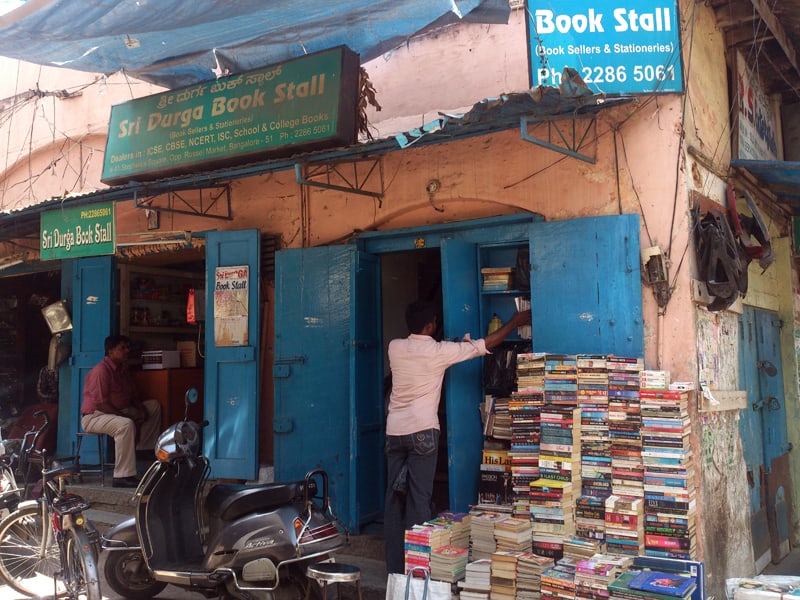That afternoon, we had been looking for the Durga Book Store in Shivajinagar. I had been told that it might still be there, a bookstore where residents of Frazer town and Benson town had shopped in the 50s as had others from the city. There were many who had memories of going there during their school days. It had been the popular bookstore at that time. We found it. It was still there. Just across the road from Russell market. In a little lane off the Noronha road, right at the corner.

Pic.credit: Pranathi
When we went in there, it was in the hope of starting a conversation about the history of the bookstore. The two men who were there were reluctant to talk to us. We felt we were not welcome there. We did not leave. Just waited. A conversation began. It was the month of May, the time of the year when everyone bought their schoolbooks, when business was always at its peak. Always. You would never see the shop empty. Not like you do today. Then, we knew. The sadness filtered through. With online sales becoming popular and with the government issuing state board books directly at the school level, the business of Durga book store had been severely affected.
The conversation continued. The Durga book store was about 60 years old. It was started by M.K.Raju, the current proprietor’s grandfather, between 1954 and 1956. Mahboob, who works here mentioned that the store originally opened as Durga Sound Studio. For some years, it was a library and later became a bookstore. The store saw students from most of the ICSE schools in the neighbourhood. Everyone found what they needed here. Besides, the bookstore printed school labels for the children and gave out labels and brown paper along with the textbooks. Children loved coming here. Today, inspite of the difficulties, the shop continues to exist. It has not shut down and has no immediate plans to close. The owner pointed out that he had changed little inside the shop. His parents would have liked it to remain as it is. His father had told him that even if the business did not do well, he must never sell the shop.
This is the story of a neighbourhood bookstore in Bangalore. It is also the story of international chains of bookstores such as Borders and Barnes & Noble who faced tough competition from online book-selling companies like Amazon and have been forced to close their stores. If you’d like to read more on this, sharing a link to: 5 Reasons why Borders went out of Business and End of the Book for Barnes & Noble.
Coming back to the Durga Book Store, the discussion moved to how things were back then on this street. There was a bakery in the lane opposite to the bookstore that extended upto the street. Foreigners came here to buy. The kitchen for the bakery used wood for their oven. There was an Indian Coffee bar at the junction of Noronha road and Chandni Chowk. You could buy a coffee in a large glass for 5 paise, a bun for 10 paise, a bun with sugar and butter for 15 paise. He then talked about how things had changed in the neighbourhood. He felt that this area had not developed as much as the other parts of the city. In the old days, the street was extremely clean because there was regular inspection. Today, there was this perpetual smell of garbage that they had to live with. Also, parking was a huge problem. The central taxi stand, the part opposite the Durga book store had earlier been a bicycle stand, many people used bicycles then, and now it was a parking space for cars and two-wheelers.
We listened to these reflections and later it made me think about how with every book shop that closes, with every coffee shop that moves from a street, it is a sign that people are changing and that neighbourhoods are changing. When India Coffee house moved from M.G.Road to Church street, it was as Which Main? What Cross? said: “…a short hop from the old location but still miles away from what it originally was.” It was a different street, but the same neighbourhood. And yet, it wasn’t the same thing. The India Coffee house was a simple, traditional place now transplanted onto a gentrified street. Church street was not M.G.road. But in these times, M.G.road was not “M.G.road” either. Now, there was the metro and the Rangoli art center and all the traffic that gave M.G.road it’s new identity, just as it was Matteo, Krispy Kreme, Star Bucks and the ‘Church Street Social’ that gave Church street it’s identity. Church street was about the new coffee culture.
The changing book cultures and changing coffee cultures seem to transform us and our neighbourhoods. India Coffee house chose to not close down but to move, to this street with its new coffee culture. What is good about that is that you can still go there whenever you want to. The Durga book store has not closed down. And, it has not moved from where it always was. This means that anyone who remembers going there before can still go back there. If only to see that a changing book culture has not taken a collective memory away from us and our neighbourhoods. At least, not yet.